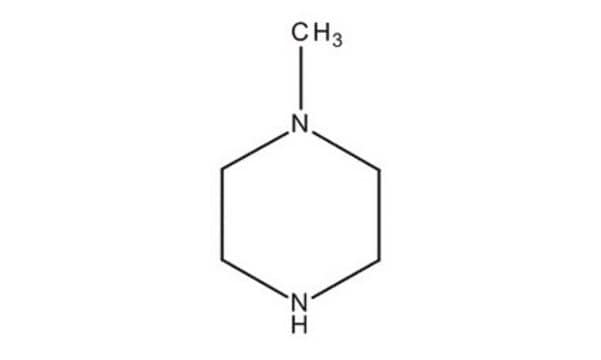W324108
Trimethylamine solution
25 wt. % in H2O
Synonym(s):
N,N-dimethylmethanamine
About This Item
Recommended Products
biological source
synthetic
Quality Level
grade
Kosher
vapor density
2.04 (vs air)
vapor pressure
232 mmHg ( 20 °C)
autoignition temp.
374 °F
concentration
25 wt. % in H2O
refractive index
n20/D 1.357
application(s)
flavors and fragrances
Documentation
see Safety & Documentation for available documents
Looking for similar products? Visit Product Comparison Guide
Application
- Unraveling Ammonia and Trimethylamine Uptake on Conductive Doped Polyaniline.: This research investigates the adsorption properties of ammonia and trimethylamine on conductive doped polyaniline, contributing to the development of advanced materials for gas sensing applications (Pascaud et al., 2024).
- TMAO perturbs intermolecular vibrational motions of water revealed by low-frequency modes.: The study delves into how trimethylamine-N-oxide (TMAO) affects the vibrational motions of water molecules, providing insights into the molecular interactions in aqueous solutions (Liu & Okuno, 2024).
- Trimethylamine-N-oxide depletes urea in a peptide solvation shell.: This article explores the interaction between TMAO and urea in peptide solvation shells, enhancing our understanding of protein stability in varying chemical environments (Nasralla et al., 2024).
- Co-Solutes Induced Changes in the Properties of Polymeric Solution and Water Dynamics.: This research investigates the impact of co-solutes, including trimethylamine, on the properties of polymeric solutions and water dynamics, contributing to the field of solution chemistry (Bhattacharjee et al., 2024).
Disclaimer
Signal Word
Danger
Hazard Statements
Precautionary Statements
Hazard Classifications
Eye Dam. 1 - Flam. Liq. 2 - Skin Corr. 1B - STOT SE 3
Target Organs
Respiratory system
Storage Class Code
3 - Flammable liquids
WGK
WGK 1
Flash Point(F)
37.9 °F - closed cup
Flash Point(C)
3.3 °C - closed cup
Personal Protective Equipment
Certificates of Analysis (COA)
Search for Certificates of Analysis (COA) by entering the products Lot/Batch Number. Lot and Batch Numbers can be found on a product’s label following the words ‘Lot’ or ‘Batch’.
Already Own This Product?
Find documentation for the products that you have recently purchased in the Document Library.
Customers Also Viewed
Our team of scientists has experience in all areas of research including Life Science, Material Science, Chemical Synthesis, Chromatography, Analytical and many others.
Contact Technical Service










